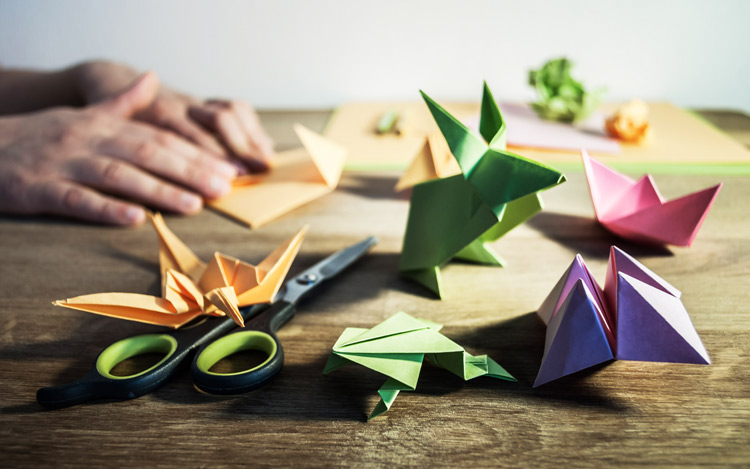 Recovering from drug or alcohol addiction requires a holistic approach that heals the mind, body, and spirit. For many people, sobriety provides an opportunity to explore their creative side.
Recovering from drug or alcohol addiction requires a holistic approach that heals the mind, body, and spirit. For many people, sobriety provides an opportunity to explore their creative side.
Benefits of Creativity in Addiction Recovery
Creative pastimes provide a number of important benefits for people in recovery. For example:
- Creativity provides a safe place for expressing uncomfortable feelings. Often, people with substance use disorders turn to drugs or alcohol as a way to cope with anger, depression, anxiety, and other unpleasant emotions. Creative activities let people in recovery process their emotions on their own terms, which is why art, music, and/or drama therapy are often used in recovery programs.
- Creativity lets you explore alternative perspectives. Making art, whether you’re singing, drawing, or writing, gives you the opportunity to explore different perspectives and ways of looking at the challenges in your life. In fiction writing, for example, you’re seeing the same story through the eyes of several different characters.
- Creativity helps boost self-esteem. Making art lets you build a new identity for yourself free from the burden of substance abuse. Finishing a new masterpiece or seeing evidence of improvement in your skills gives you a sense of accomplishment, which can inspire you to apply the same persistence to your recovery efforts.
- Creativity keeps you from being bored. When you’re struggling to fill the extra hours in your day, creative activities can help keep boredom at bay. Hobbies that require minimal supplies and don’t necessarily need others to participate are ideal for people in recovery who are interested in using art as a way to fight off cravings for drugs and alcohol. However, making art with friends and family can help you rebuild connections that might have been strained by your past addiction-related behavior.
- Creativity provides opportunities for socialization. Being lonely in recovery is common if you’ve had to end relationships with people who aren’t supportive of your efforts to make a better life for yourself. However, creative hobbies provide a new opportunity to connect with others who share similar interests. Even though there are many in-person classes, exhibits, and performances that have been canceled due to COVID-19, there are thriving online communities devoted to every form of artistic expression imaginable. Sharing your work, asking questions, and brainstorming with others can help you feel less isolated in your recovery journey.
Ways to Be Creative
If you don’t consider yourself a naturally creative person, keep in mind that there are many ways to explore your creative side. Some ideas to consider include:
- Visual art. Drawing, painting, photography, or sculpting
- Performance art. Dance, theatre, or filmmaking
- Music. Singing, songwriting, or playing an instrument
- Creative writing. Poetry, fiction, or memoir
- Fiber art and needle crafts. Sewing, quilting, knitting, or crocheting
- Woodworking. Wood carving, wood burning, refinishing, or repurposing
- Paper crafts. Origami, stamping, card making, or scrapbooking
To learn more about a particular creative pursuit:
- Hit the local library. Public libraries are an excellent source of information about every creative hobby imaginable. You’ll find books and magazines with patterns, project ideas, techniques, and more.
- Ask a friend or family member. If you know someone who is proficient in the creative hobby you wish to try, ask them for their advice. They may be willing to offer tips and techniques, share supplies, or collaborate on a project together.
- Search for YouTube tutorials. Artists, writers, musicians, and crafters of all skill levels create tutorials you can view for free on YouTube. Some of these individuals, such as The Art Sherpa, offer free live streams that let you ask questions via a chat function as the project is being completed.
- Take a free class. Craft stores frequently offer classes to help customers explore new forms of art. Because of the COVID-19 pandemic, Michaels has moved their classes online. Review their Community Classroom page to see options for free Zoom classes covering paint pouring, watercolors, knitting, beading, bullet journaling, and more.
As you’re exploring different creative hobbies, remember that the goal is to focus on your own personal journey. It’s fine to be influenced by the creative style of people you admire, but you should resist the urge to make unfair comparisons. You are an individual, and your work is an expression of your own unique perspective on the world.
We’re Here to Help
If you’re ready to build a life free from the burden of drug and alcohol abuse, St. Joseph Institute for Addiction can help. Our Pennsylvania residential substance abuse treatment center continues to remain open as an essential business throughout the COVID-19 pandemic. We have implemented increased infection control procedures as recommended by the CDC so we can provide our clients with effective treatment in a safe and supportive environment. Contact us today to learn why now is your time to enter recovery.
To learn more about SJI, addiction treatment near Altoona, PA, and our programs, please contact us at (814) 228-8881.

